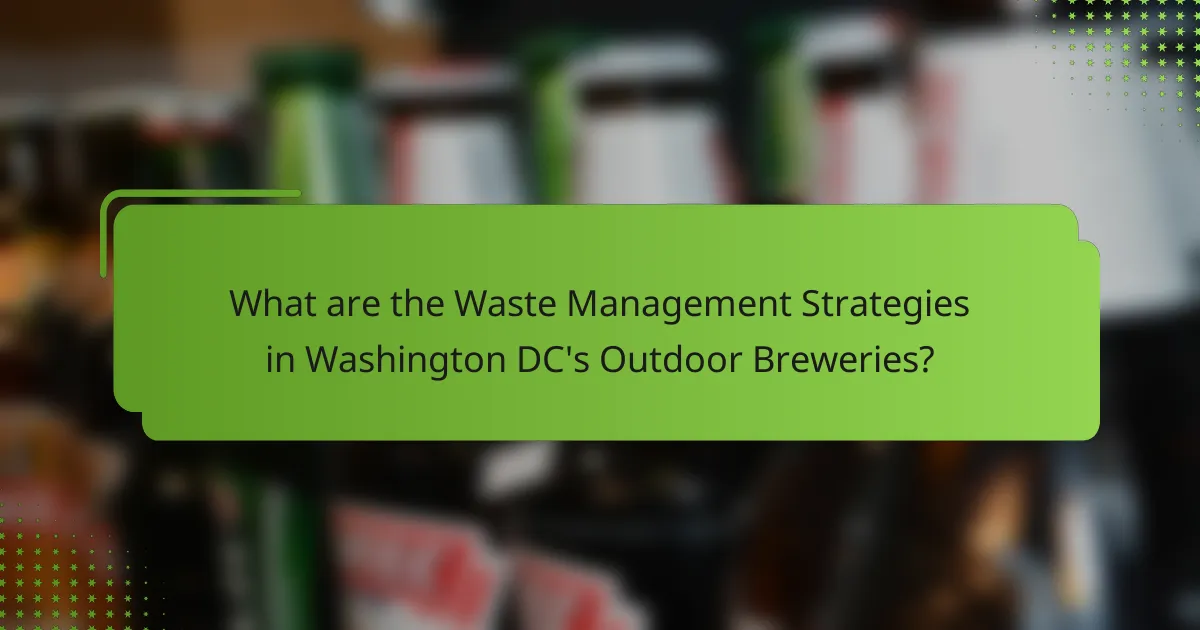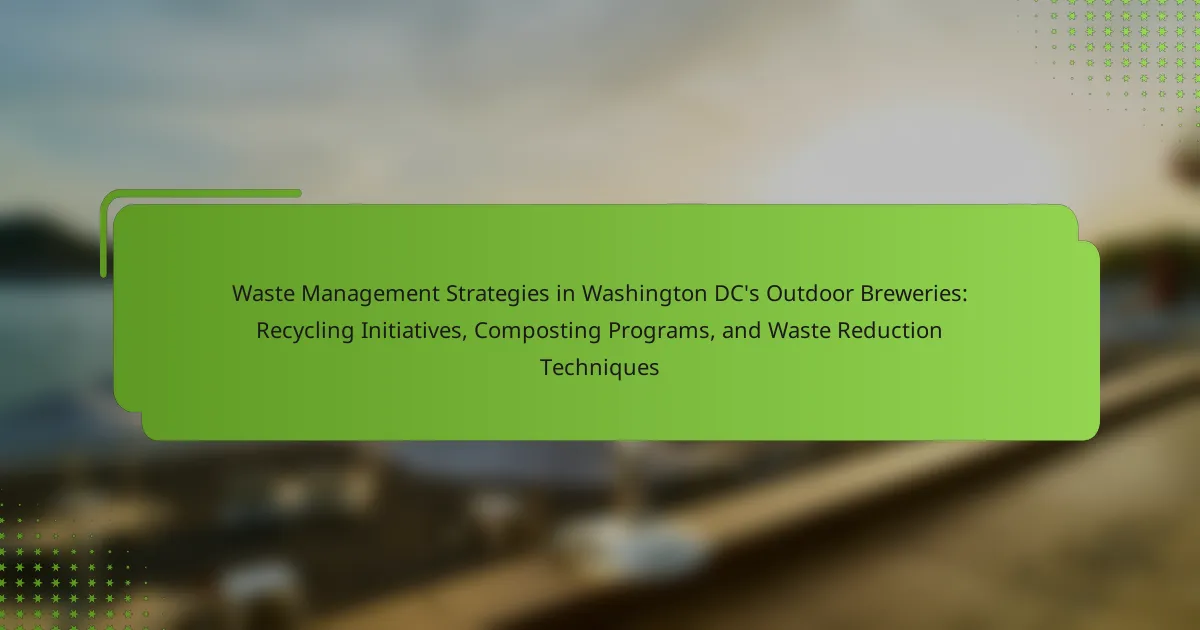Washington DC’s outdoor breweries are implementing various waste management strategies to enhance sustainability. These strategies include recycling initiatives, composting programs, and waste reduction techniques. Breweries provide designated bins for recyclable materials and partner with local composting services to divert organic waste. Additionally, many breweries focus on reducing single-use plastics by promoting reusable containers and encouraging patrons to bring their own. Regular waste audits are conducted to identify areas for improvement, collectively aiming to minimize landfill contributions.

What are the Waste Management Strategies in Washington DC’s Outdoor Breweries?
Washington DC’s outdoor breweries implement several waste management strategies. These include recycling initiatives, composting programs, and waste reduction techniques. Breweries often provide designated bins for recyclable materials. They also partner with local composting services to divert organic waste. Many breweries focus on reducing single-use plastics. They promote the use of reusable containers and encourage patrons to bring their own. Some breweries conduct regular waste audits to identify improvement areas. These strategies collectively aim to minimize landfill contributions and promote sustainability.
How do these strategies contribute to environmental sustainability?
Waste management strategies in Washington DC’s outdoor breweries contribute to environmental sustainability by reducing waste and promoting resource recovery. Recycling initiatives divert materials from landfills, thereby minimizing pollution and conserving natural resources. Composting programs transform organic waste into nutrient-rich soil, enhancing soil health and reducing methane emissions from landfills. Waste reduction techniques, such as minimizing packaging and optimizing production processes, lower overall waste generation. Together, these strategies decrease the environmental footprint of breweries, support local ecosystems, and foster a circular economy. According to the EPA, recycling and composting prevented the release of 186 million metric tons of carbon dioxide equivalent into the air in 2013, highlighting the significant impact of these practices.
What specific waste management practices are implemented in these breweries?
Breweries in Washington DC implement several specific waste management practices. They utilize recycling initiatives to process materials like glass, cardboard, and plastic. Composting programs are in place to manage organic waste, including spent grains and hops. Waste reduction techniques focus on minimizing overall waste production through efficient resource management. Many breweries also collaborate with local farms to repurpose waste products as animal feed. These practices contribute to sustainability and reduce environmental impact.
How do outdoor breweries differ in waste management compared to indoor facilities?
Outdoor breweries differ in waste management compared to indoor facilities primarily due to their reliance on natural processes. Outdoor breweries often utilize composting programs to manage organic waste effectively. This approach leverages outdoor space for compost piles, which can decompose materials more efficiently.
In contrast, indoor facilities typically rely on centralized waste disposal systems. Indoor breweries may have limited space for composting, leading to higher reliance on landfill disposal. Additionally, outdoor breweries can implement recycling initiatives that take advantage of their open environment for sorting and processing recyclables.
Research indicates that outdoor breweries often have lower waste generation rates due to their sustainable practices. For example, a study by the Brewers Association highlights that outdoor facilities can reduce waste by up to 30% through composting and recycling efforts.
Why are recycling initiatives important for outdoor breweries?
Recycling initiatives are important for outdoor breweries because they reduce waste and promote sustainability. Outdoor breweries generate significant amounts of waste, including packaging materials and organic waste. Implementing recycling programs helps divert these materials from landfills. This not only minimizes environmental impact but also conserves resources. For instance, recycling glass and aluminum saves energy compared to producing new materials. Additionally, consumers increasingly prefer eco-friendly businesses. A study found that 70% of consumers are more likely to support brands with sustainable practices. Thus, recycling initiatives enhance brand reputation and attract environmentally conscious customers.
What types of materials are commonly recycled in these breweries?
Breweries commonly recycle materials such as glass, aluminum, and cardboard. Glass bottles are often returned and reused or crushed for recycling. Aluminum cans are collected and sent to recycling facilities for remanufacturing. Cardboard packaging is typically flattened and processed for recycling. Additionally, some breweries recycle plastic materials, like kegs and containers. These practices help reduce waste and support sustainability efforts in the brewing industry.
How do these recycling initiatives impact the local community?
Recycling initiatives positively impact the local community by reducing waste and promoting sustainability. These programs encourage community members to participate in environmentally friendly practices. They help decrease landfill usage, which can lower local taxes associated with waste management. Recycling initiatives also create local jobs in sorting and processing materials. Additionally, they foster community pride and awareness about environmental issues. Studies have shown that communities with active recycling programs report higher levels of civic engagement. In Washington DC, recycling initiatives have contributed to a 25% increase in recycling rates over the past five years. This demonstrates the tangible benefits of such programs for local residents.
What role does composting play in waste management for outdoor breweries?
Composting plays a crucial role in waste management for outdoor breweries. It helps divert organic waste, such as grain and hops, from landfills. This process reduces greenhouse gas emissions associated with waste decomposition. Composting also creates nutrient-rich soil amendments for local agriculture. Many outdoor breweries implement composting programs to enhance sustainability. Studies show that composting can reduce waste volume by up to 30%. This practice aligns with environmental goals and community engagement. Outdoor breweries that compost contribute positively to local ecosystems and promote responsible waste management.
What materials can be composted in these settings?
Organic materials can be composted in these settings. This includes food scraps such as fruit and vegetable peels. Yard waste like leaves, grass clippings, and small branches is also compostable. Coffee grounds and filters are suitable for composting as well. Eggshells provide calcium and are beneficial in compost. Paper products like uncoated cardboard and paper towels can be added too. These materials decompose and enrich the soil, promoting sustainability. Composting reduces landfill waste, contributing to environmental health.
How does composting benefit the brewery’s operations and the environment?
Composting benefits a brewery’s operations by reducing waste disposal costs and enhancing soil health. It allows breweries to recycle organic waste, such as spent grains and hops, into nutrient-rich compost. This process minimizes landfill contributions and lowers waste management expenses. Environmentally, composting reduces greenhouse gas emissions associated with waste decomposition. It also supports local agriculture by providing organic matter that improves soil fertility. Studies show that composting can divert up to 30% of a brewery’s waste from landfills. This practice fosters sustainability and promotes a circular economy within the brewing industry.
What waste reduction techniques are utilized in Washington DC’s outdoor breweries?
Washington DC’s outdoor breweries utilize several waste reduction techniques. These include implementing recycling programs for bottles and cans. Breweries also practice composting of organic waste such as spent grains and food scraps. Many establishments engage in source reduction strategies by minimizing packaging materials. Some breweries partner with local farms to donate excess food. Others focus on reusing materials within their operations. These techniques collectively contribute to reducing landfill waste and promoting sustainability in the brewing industry.
How can breweries minimize waste generation during production?
Breweries can minimize waste generation during production by implementing efficient practices and technologies. They can optimize ingredient usage to reduce excess materials. For example, using precise measurements ensures minimal leftover grains and hops. Breweries can also recycle by-products, such as using spent grains for animal feed or composting. This approach not only reduces waste but also creates additional revenue streams. Furthermore, breweries can adopt closed-loop systems to reuse water in the brewing process. Studies show that water recycling can reduce overall water consumption by up to 50%. Additionally, staff training on waste reduction practices can enhance awareness and compliance. Implementing these strategies leads to significant reductions in waste generation during production.
What are some successful case studies of waste reduction in local breweries?
One successful case study of waste reduction in local breweries is New Belgium Brewing Company. They implemented a zero-waste program that diverts over 99% of waste from landfills. This initiative includes recycling, composting, and reusing materials. Another example is Sierra Nevada Brewing Co., which has achieved a 99.8% diversion rate. They focus on energy efficiency and water conservation, minimizing waste generation. Additionally, Dogfish Head Brewery has adopted a grain-to-glass approach. They use spent grains for animal feed and composting. These breweries demonstrate effective waste reduction strategies that can serve as models for others in the industry.
How do these waste management strategies influence consumer behavior?
Waste management strategies influence consumer behavior by promoting sustainability and environmental awareness. When outdoor breweries implement recycling initiatives, they encourage patrons to participate in responsible waste disposal. This engagement fosters a sense of community responsibility among consumers. Composting programs further educate customers about organic waste management. As consumers observe these practices, they are more likely to adopt similar behaviors at home. Waste reduction techniques, such as minimizing single-use plastics, also shape consumer choices. Studies show that consumers are increasingly drawn to businesses that prioritize eco-friendly practices. This shift in behavior can enhance customer loyalty and brand reputation.
What best practices can outdoor breweries adopt for effective waste management?
Outdoor breweries can adopt several best practices for effective waste management. Implementing a comprehensive recycling program is essential. This includes clearly labeled bins for different materials. Outdoor breweries should also establish a composting program for organic waste. Composting can reduce landfill contributions and create nutrient-rich soil. Educating staff and patrons about waste disposal is crucial. Training can improve recycling rates and reduce contamination. Conducting regular waste audits can identify areas for improvement. Tracking waste generation helps in setting reduction goals. Collaborating with local waste management services can enhance efficiency. These strategies collectively promote sustainability and reduce environmental impact.
Waste Management Strategies in Washington DC’s outdoor breweries focus on recycling initiatives, composting programs, and waste reduction techniques. These breweries implement specific practices such as designated recycling bins, partnerships with local composting services, and efforts to minimize single-use plastics. The article explores how these strategies contribute to environmental sustainability by reducing landfill waste and promoting resource recovery. Additionally, it highlights the impact of these practices on consumer behavior and local communities, showcasing successful case studies and best practices for effective waste management in the brewing industry.
